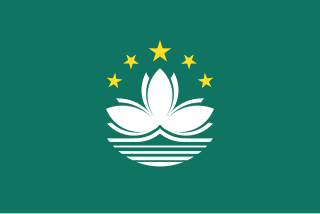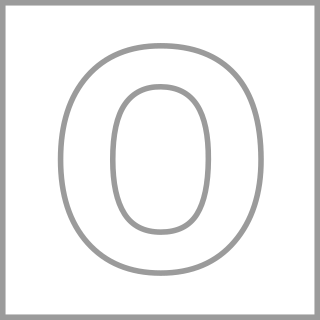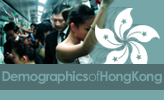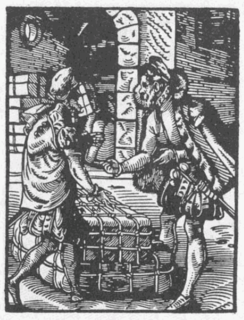
Under the Basic Law, the Hong Kong Special Administrative Region is exclusively in charge of its internal affairs and external relations, whilst the Government of the People's Republic of China is responsible for its foreign affairs and defence. As a separate customs territory, Hong Kong maintains and develops relations with foreign states and regions, and plays an active role in such international organisations as World Trade Organization (WTO) and the Asia-Pacific Economic Cooperation (APEC) in its own right under the name of Hong Kong, China. Hong Kong participates in 16 projects of United Nations Sustainable Development Goals.

Macau or Macao, officially the Macao Special Administrative Region of the People's Republic of China, is a special administrative region on the western side of the Pearl River estuary in southern China. With a population of 653,100 and an area of 32.9 km2 (12.7 sq mi), it is the most densely populated region in the world.

"One country, two systems" is a constitutional principle formulated by Deng Xiaoping, the Paramount Leader of the People's Republic of China (PRC), for the reunification of China during the early 1980s. He suggested that there would be only one China, but distinct Chinese regions such as Hong Kong and Macau could retain their own economic and administrative systems, while the rest of the PRC uses the socialism with Chinese characteristics system. Under the principle, each of the two regions could continue to have its own governmental system, legal, economic and financial affairs, including trade relations with foreign countries.

The Basic Law of the Hong Kong Special Administrative Region of the People's Republic of China is the supreme law in the Hong Kong Special Administrative Region and a national law of the People's Republic of China. Comprising nine chapters, 160 articles and three annexes, the Basic Law was adopted on 4 April 1990 by the Seventh National People's Congress and signed by President Yang Shangkun.

The Ministry of Commerce of the People's Republic of China (MOFCOM), is a Cabinet-level executive agency of the State Council of China. It is responsible for formulating policy on foreign trade, export and import regulations, foreign direct investments, consumer protection, market competition and negotiating bilateral and multilateral trade agreements. The current Commerce minister is Zhong Shan.

Election in Hong Kong take place when certain political offices in the government need to be filled. Every four years, half of the unicameral Legislative Council of Hong Kong's seventy seats representing the geographical constituencies are returned by the electorate; the other thirty five seats representing the functional constituencies are elected through smaller closed elections within business sectors.
Steven Ng-Sheong Cheung is a Hong-Kong-born American economist who specializes in the fields of transaction costs and property rights, following the approach of new institutional economics. He achieved his public fame with an economic analysis on China open-door policy after the 1980s. In his studies of economics, he focuses on economic explanation that is based on real world observation. He is also the first to introduce concepts from the Chicago School of Economics, especially price theory, into China. In 2016, Cheung claimed to have written "1,500 articles and 20 books in Chinese" during his academic career.

The Hong Kong Higher Level Examination was a public examination taken by students in Hong Kong at the end of Form 6, in preparation for entry to the Chinese University of Hong Kong (CUHK) which then offered 4 year courses. It was different from the Hong Kong Advanced Level Examination taken by Form 7 students, and was usually taken by students from Chinese Middle schools. It was abolished in 1993 when the CUHK changed its courses to 3-years, the same as the Hong Kong University, after the introduction of the Joint University Programmes Admissions System in 1992.
The Hong Kong Human Rights Monitor (HKHRM) is a local non-governmental organisation which was established in April 1995. It aims at promoting better human rights protection in Hong Kong in the aspect of legislation and people's everyday life.
The transfer of sovereignty of Macau from the Portuguese Republic to the People's Republic of China (PRC) occurred on 20 December 1999. Macau was settled and governed by Portuguese merchants in 1535, during the Ming Dynasty. Portugal's involvement in the region was formally recognized by the Qing in 1749. The Portuguese governor João Maria Ferreira do Amaral, emboldened by the First Opium War and the Treaty of Nanking, attempted to annex the territory, expelling Qing authorities in 1846, but was assassinated. After the Second Opium War, the Portuguese government, along with a British representative, signed the Sino-Portuguese Treaty of Peking that gave Portugal sovereignty over Macau, on the condition that Portugal would cooperate in efforts to end the smuggling of opium.

The O Level is a subject-based qualification conferred as part of the General Certificate of Education. It was introduced as part of British educational reform alongside the more in-depth and academically rigorous A-level in England, Wales and Northern Ireland. Those three jurisdictions replaced O Levels gradually with General Certificate of Secondary Education (GCSE) and International General Certificate of Secondary Education (IGCSE) exams over time. The Scottish equivalent was the O-grade. The O Level qualification is still awarded by CIE Cambridge International Examinations, the international counterpart of the British examination Board OCR, in select locations, instead of or alongside the International General Certificate of Secondary Education qualifications. Both CIE and OCR have Cambridge Assessment as their parent organisation. The Cambridge O Level has already been phased out, however, and is no longer available in certain administrative regions.

The following outline is provided as an overview of and topical guide to Hong Kong:

Moral and national education is a school curriculum proposed by the Education Bureau of Hong Kong, changed from the moral and civic education. The subject was particularly controversial for applauding the communist and nationalist positions of China's government on the one hand, and criticising republicanism and democracy on the other.
Liberalism has a long tradition in Hong Kong as an economic philosophy and has become a major political trend since the 1980s, often represented the pro-democracy camp, apart from conservatism which often constitutes the pro-Beijing camp.

Hong Kong–Qatar relations refers to bilateral foreign relations between Hong Kong and Qatar. While both Qatar and Hong Kong are geographically small and in separate regions of the Asian continent, the connections between the two have a long history.
















